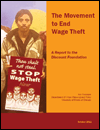What would you do if your employer didn’t pay you for your time on the job? Or failed to compensate you for overtime? Or paid you less than the minimum wage?
These types of wage violations actually aren’t that uncommon. Casa Latina, a Seattle non-profit that has been battling wage theft for over ten years, reported that they receive nearly 250 calls per year from workers complaining of wage theft. And a 2008 survey of low-wage workers in Chicago, Los Angeles and New York City found that more than a quarter of low-wage workers are paid less than minimum wage and more than three quarters are not paid for overtime work.
Employers have been able to get away with these practices because many low-wage workers are afraid of losing work and the little income they do receive. Some workers are undocumented immigrants who are fearful of deportation if they refuse to withstand theft by employers.
Here in Washington state, Governor Gregoire signed a 2010 bill establishing better administration of wage complaints and violations. And the Seattle City Council took that legislation a step further by passing a city ordinance that expands the definition of wage theft and increases penalties for employers found guilty of it.
Testimony to the City Council included many personal stories from workers about their experiences of being denied rightful pay. When complaints are filed with the Labor and Industries Department, determinations are often found in favor of the worker. However, whether those workers ever receive what is rightfully owed is another story. Of the more than $18 million found to be owed to Casa Latina clients over the last four years, less than $8 million has been recovered.
The Discount Foundation, which works for jobs and living wages, recently released a new report about the prevalence of wage theft across the United States. It covers efforts to establish and enforce regulations against wage theft, and stresses that while wage recovery is a necessary focus, the overall goal for organizations representing these workers must be legislation and regulations that ultimately eliminate wage theft.
Hopefully, Seattle’s new ordinance will serve as a deterrent to employers, reduce the occurrence of wage theft and promote better workplace standards in local low-wage industries.
More To Read
March 24, 2025
Remembering former Washington State House Speaker Frank Chopp
Rep. Chopp was Washington state’s longest-serving Speaker of the House
February 11, 2025
The rising cost of health care is unsustainable and out of control
We have solutions that put people over profits
January 29, 2025
Who is left out of the Paid Family and Medical Leave Act?
Strengthening job protections gives all workers time they need to care for themselves and their families

